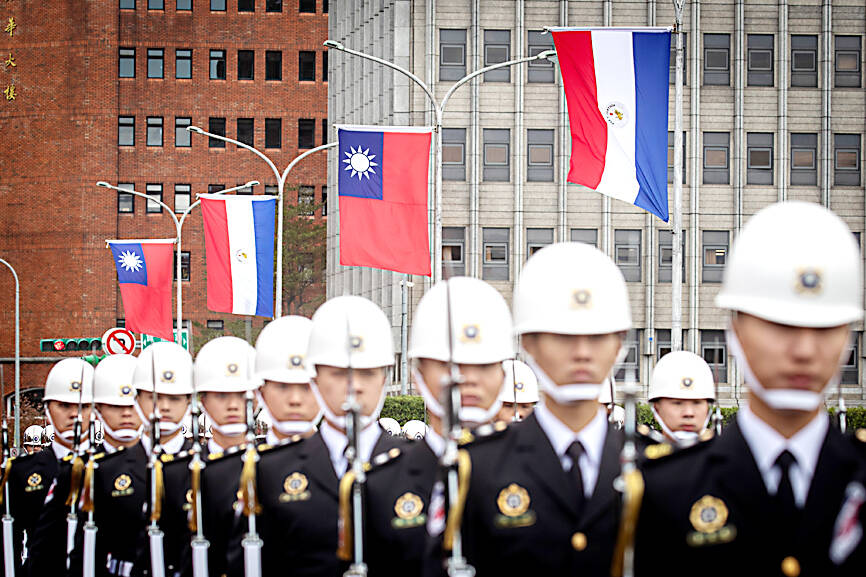The Chinese government has signed one-month contracts with Paraguayan media outlets to promote negative coverage of Vice President William Lai’s (賴清德) visit next week to the South American country, as it seeks to discredit Taiwan and affect its presidential election in January, national security sources said on condition of anonymity.
That includes content supporting Beijing’s claim that Taiwan is part of China, accusing Taiwan of hurting Paraguay’s stability and “welcoming” China for the sake of Paraguay’s advancement, they said on Wednesday.
The Ministry of Foreign Affairs (MOFA) condemned the actions, calling them part of China’s “cognitive warfare to interfere” with Lai’s trip.

Photo: Ritchie B. Tongo, EPA-EFE
“China has been bribing media over the past two weeks to release false reports that smear Taiwan’s diplomatic efforts in an attempt to suppress Taiwan’s diplomatic space,” it said in a statement.
The Chinese Ministry of Foreign Affairs did not immediately respond to a request for comment.
When Lai transits through the US, Beijing has mobilized the Alliance for China’s Peaceful Reunification and Chinese expatriates to protest, a national security official said yesterday on condition of anonymity, citing intelligence sources.
When Lai arrives in New York and San Francisco, Chinese demonstrators would stage rallies, while pro-Beijing ads would appear in local Chinese-language newspapers, they said.
At the same time, Beijing-controlled media in Taiwan are expected to generate skepticism about Lai as they attempt to frame the presidential election next year as a choice between war and peace, the official said.
In response to China’s announcement that it would hold military drills in the East China Sea from today, the Ministry of National Defense yesterday said that the Chinese People’s Liberation Army (PLA) is likely to stage its own response to Lai’s visit by making a show of the upcoming Eastern Theater Command’s annual exercise.
These drills’ purpose would be to interfere with Taiwan’s election and intimidate voters into choosing candidates preferred by Beijing, the ministry said.
The PLA’s deployment of warships and military aircraft near Taiwan were frequently conducted in conjunction with Beijing’s cognitive warfare efforts in mind, it said, adding that it uses false reporting to amplify the effect of the drills.
Its most likely course of action is to conduct a beefed-up version of its so-called “preparedness patrols” in April and send even more ships and airplanes near Taiwan, national security sources said.
Taipei is closely monitoring the PLA’s movements with the expectation that some display of military force would come with the exercise, they said.
“If China uses this [Lai’s trip] to take provocative action, it will be China that damages regional peace and security, not Taiwan or the United States,” MOFA spokesman Jeff Liu (劉永健) told reporters.
Taipei-based diplomats were divided on China’s likely reaction, eight diplomatic and foreign security sources said.
One said Beijing’s and Washington’s bid to improve relations could temper China’s response.
However, a senior foreign security source said Beijing would have to put on a show of force given its angry denouncements of the trip.
“They have pretty much backed themselves into a corner and will have to do something,” the source told Reuters.
Additional reporting by Bloomberg, Reuters and Wu Su-wei

An essay competition jointly organized by a local writing society and a publisher affiliated with the Chinese Communist Party (CCP) might have contravened the Act Governing Relations Between the People of the Taiwan Area and the Mainland Area (臺灣地區與大陸地區人民關係條例), the Mainland Affairs Council (MAC) said on Thursday. “In this case, the partner organization is clearly an agency under the CCP’s Fujian Provincial Committee,” MAC Deputy Minister and spokesperson Liang Wen-chieh (梁文傑) said at a news briefing in Taipei. “It also involves bringing Taiwanese students to China with all-expenses-paid arrangements to attend award ceremonies and camps,” Liang said. Those two “characteristics” are typically sufficient

The brilliant blue waters, thick foliage and bucolic atmosphere on this seemingly idyllic archipelago deep in the Pacific Ocean belie the key role it now plays in a titanic geopolitical struggle. Palau is again on the front line as China, and the US and its allies prepare their forces in an intensifying contest for control over the Asia-Pacific region. The democratic nation of just 17,000 people hosts US-controlled airstrips and soon-to-be-completed radar installations that the US military describes as “critical” to monitoring vast swathes of water and airspace. It is also a key piece of the second island chain, a string of

A magnitude 5.9 earthquake that struck about 33km off the coast of Hualien City was the "main shock" in a series of quakes in the area, with aftershocks expected over the next three days, the Central Weather Administration (CWA) said yesterday. Prior to the magnitude 5.9 quake shaking most of Taiwan at 6:53pm yesterday, six other earthquakes stronger than a magnitude of 4, starting with a magnitude 5.5 quake at 6:09pm, occurred in the area. CWA Seismological Center Director Wu Chien-fu (吳健富) confirmed that the quakes were all part of the same series and that the magnitude 5.5 temblor was

The Central Weather Administration has issued a heat alert for southeastern Taiwan, warning of temperatures as high as 36°C today, while alerting some coastal areas of strong winds later in the day. Kaohsiung’s Neimen District (內門) and Pingtung County’s Neipu Township (內埔) are under an orange heat alert, which warns of temperatures as high as 36°C for three consecutive days, the CWA said, citing southwest winds. The heat would also extend to Tainan’s Nansi (楠西) and Yujing (玉井) districts, as well as Pingtung’s Gaoshu (高樹), Yanpu (鹽埔) and Majia (瑪家) townships, it said, forecasting highs of up to 36°C in those areas